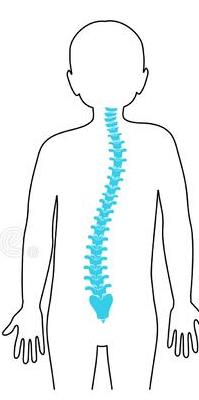My Journey
Finally, as promised, here’s a little info on how I got to the point where a tongue tie release seemed like the only way forward. Let’s hope my attempts to keep this reasonably brief are successful!
I was definitely not the most athletic kid as a child. Physical education class was something I dreaded and the gymnastics part of the curriculum was especially difficult for me. Try as I might, I just couldn’t put the movements together. No one picked me to be on their team until almost every last kid in the class had been chosen. Who says tongue tie can’t have a negative effect on self-esteem ?
One of the most telling incidents occurred when I was about 15 and the family was learning to waterski. My younger siblings had all mastered the skill, even my 6-year old brother. I must have tried a hundred times. Finally Dad just gave up on ever getting me up on skis. One day when they were all in town, my friends’ older cousin came by our cottage rental with his boat and encouraged me to try again. The first few efforts were, as usual, unsuccessful, but when he suggested that I drop one ski as soon as I felt the water harden under me – success!!! The right leg had somehow been an impediment. From then on, I consistently skied on one water ski with no issues. For me, it’s been the right side that’s been problematic all the way along.
I was 16 when my jaw dislocated for the first time. The family cat had just been run over by a car, so everyone was very distressed and I must have been feeling extra tension. I yawned and out popped the left joint. The pain was unbearable and I don’t recall how I got it back in, but it was the first of many such dislocations.


Later when I began my studies at university, I stayed in residence for the first two years and I quickly learned that I wasn’t like my floor mates. After late nights, they seemed to rally and were as energetic as usual the next day – while I was a basket case and stumbled through the day. I guess I was already clenching and grinding my teeth.
At the time, a dentist told me that my gums were receding because of poor brushing, but in fact, as I found out later, it was the constant pressure on my teeth. I had my wisdom teeth removed because my bite was becoming badly maloccluded, but it didn’t help. I had a serious overbite and couldn’t find a comfortable resting place when my mouth was closed – which of course, led to more mouth breathing. A vicious circle that was compounded by my seasonal allergies! Apparently, inflammation in the nasal passages encourages more breathing through the mouth and that increases sinus congestion.

In the early years of my career, no doubt due to the added stress, jaw joint dislocations became more frequent. I had to be very conscious every time I yawned or it would slip out. It had found a comfortable pathway, and it went there at the most inopportune times. Closing my mouth, eating and speaking weren’t options during a dislocation and a trip to the Emergency Department for a local anesthetic was the usual remedy. Finally, my husband encouraged me to relax in bed and apply warm compresses and that became our go-to solution. Over the years, the frequency of these episodes thankfully lessened.
The constant headaches and muscle tightness drove me to the medical community for answers. The trouble I sometimes had swallowing was due to stress, said my physician of the time. Really ? I was told many times that I was suffering from anxiety – and I guess that was partially true. When your insides are all tied up in a knot, and your breathing is poor, it’s difficult to not to feel anxious. Occasionally I’d be so frustrated in a specialist’s office that the tears would start to flow. Then the anxiety diagnosis would become more firmly entrenched.
In the end, I was diagnosed with fibromyalgia. I never fully accepted that finding as it just didn’t seem right. I read about the condition extensively and attended a Fibromyalgia Clinic at the local hospital, but I was clearly in a much better place than my fellow participants. I forgot about it and moved on. About 15 years later, that diagnosis was removed! I did not meet the new criteria established by the medical community for Fibromyalgia. And so, the questions remained.

As the years went on, I developed a pain in the fifth metatarsal of my right foot. At times, it was so intense that I was limping when I walked. A physiotherapist told me that my skeleton was twisted. That comment really jived with another – that the back of my right knee was turned out. I was told by other health care practitioners that the right shoulder was turning inward, that I constantly tilted my head to the right and that I had a mild right-sided scoliosis in the thoracic spine. I had no idea what to do to correct these issues.
Speech problems followed later. My throat would become exceedingly dry and I had to carry lozenges with me at all times – not the best for someone whose voice is used every day for work! Eventually, during cold season, I developed laryngitis and couldn’t speak at all. My physician suggested I rest my voice, so I had a few six-week periods of not speaking at all. Fortunately, I wasn’t working too often at that time. There was improvement in my vocal strength, but nothing lasting.

So the next stop was speech therapy. Daily exercises and facial self-massage followed. This did have some lasting benefits, but also served to show me just how tightly everything in my jaw and throat area was being held.
And finally, I was diagnosed with a deviated septum and damaged nasal cartilage due to trauma to the area from a motor vehicle accident which had occurred in my teens. A rhinoplasty with a turbinate reduction (turbinate tissues line the inside of the nasal passages) was recommended to rebuild the area and, although this wasn’t directly tied to the tongue situation, I took advantage of the opportunity with the hope of improving the mouth breathing. The surgery was a success and definitely increased the amount of air that was available, but it didn’t change the mouth breathing. The mechanics had been repaired, but the habit remained.
So, this brings me to the point where tongue tie was suggested as a possible condition. I want to stress that most of these issues, and how they were interrelated, made little sense to me until I began to dive in, consult my TT team members and do some reading. Am I saying that a tongue tie release solved all my medical issues? Absolutely not! But the difference is more than significant! I encourage you to do the research, learn the lingo so you can speak effectively to your medical practitioners and seek out TT specialists in various disciplines to assist you in establishing whether you are a candidate for a tongue tie release. Experience the freedom that an unrestricted tongue can bring! I’ve included a page of links for your reference and I wish you the best in your journey towards better physical and emotional health.